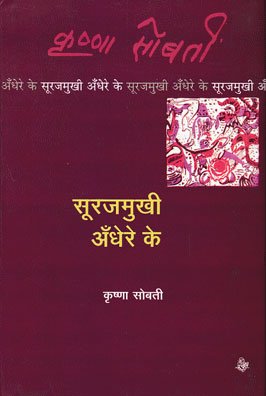Surajmukhi Andhere Ke

Rating: 4.2/5
Author: Krishna Sobti
Publisher: Rajkamal Prakashan
Publishing Date: 1 January 1972
Language: Hindi
Genre: Fiction
ISBN-10: 8126716398
ISBN-13: 978-8126716395
Format: Paperback
Pages: 141
Cost: Rs. 350 (Hardcover)
Plot:
This novels is another gem of a writing piece and unveils the feelings of a young girl “Rati” who drooled to antipathy because of a ruined childhood, because of it, she finds it hard to allow love back into her life. After spending a lifetime of letting men come close to her and rejecting them, she finds herself getting old and lonely. Rati is a strong woman. She does not allow herself the luxury of domesticity just for its own sake. She spends most of her life trampling on the feelings of men, who have tried to get close to her, without falling prey to the world of emotions.
When Rati spends some time in Shimla with her soul-sister Reema, the pretty picture of domesticity that Reema's family presents, with her devoted husband, Keshi and her little son, Kumu fascinates her. It awakens memories and yearnings in Ratti's heart.
The book is divided into 3 chapters - Pul (Bridges), Surangen (tunnels) and Akash (Sky), that are reminiscent of a train journey from Shimla to Kalka. In the first part, Ratti stands on a bridge between her old way of life and new. In the second part, she relives her past, while in the third; she makes an effort to come out from the shackles of her past.
The book presents a tale of the long established desire and life-long struggle of the human psyche. In this novel, Krishna Sobti evokes the darkest thirst of the artist's mind, layer-by-layer.
Review:
Presented in a soft, cold but warm style, this novel tells the story of a girl whose torn childhood, her innate naivety and a dichotomy between her body and mind. Sobti has established a medium and crafted the challenges beautifully and in addition to that the traditions and values simultaneously are also accurately displayed. The book establishes deep hindrances one faces with his or her psyche by simply assessing the deepest riddles of psychology on the backdrop of modern sentiment.
Moving away from the grandeur of ideals, ‘Surajmukhi Andhere Ke’ is an extraordinary true tale of the reality of darkness and the representation of truth, as truth never dies.
It’s almost astonishing how the author lays out small details to elevate the intensity of a particular situation.
Take a look at the excerpt below: (translated in English for convenience)
“In this moment, Keshi saw the title of a book. Drawed a chair near Bukhari and indicated to sit. Ratti looked at Keshi with open eyes that Keshi had seen and put the socks aside…. Reema came inside. Looked at Ratti's naked feet and put it on the tray table. When Ratti saw the glasses, her eyes became dark. Cabinet opening, then that real voice that comes only from molding. When he raised his eyes, Keshi would hold the glass….feet wrapped in sweat, then face, and lifted it from the lips and pulled a long sip inside.”
As a feminist, Sobti often wrote about women’s lives and women’s issues, but she also did not wish to be considered a female writer or something like that. She doesn’t want the gender to be in focus. Her male alter ego helped cement her identity as a “writer", putting her a full generation or two before current trends in gender studies and gender identity.
About the Author:
Krishna Sobti (born 18 February 1925; died 25 January 2019) was born in Gujrat, Punjab, now in Pakistan. She was a Hindi fiction writer and essayist, who won the Sahitya Akademi Award in 1980 for her novel Zindaginama and in 1996, was awarded the Sahitya Akademi Fellowship, the highest award of the Akademi. In 2017, She received the Jnanpith Award for her contribution to Indian literature.
Sobti was best known for her 1966 novel Mitro Marajani, an unapologetic portrayal of a married woman's sexuality. She was also the recipient of the first Katha Chudamani Award, in 1999, for Lifetime Literary Achievement, apart from winning the Shiromani Award in 1981, Hindi Academy Award in 1982, Shalaka Award of the Hindi Academy Delhi and in 2008, her novel Samay Sargam was selected for Vyas Samman, instituted by the K. K. Birla Foundation.
She also wrote under the name Hashmat and has published Hum Hashmat, a compilation of pen portraits of writers and friends. Her other noted novels are Daar Se Bichchuri, Surajmukhi Andhere Ke, Yaaron Ke Yaar and Zindaginama. Some of her well-known short stories are Nafisa, Sikka Badal gaya, Badalom ke ghere. Sobti Eka Sohabata includes her major selected works. A number of her works are now available in English and Urdu.















































